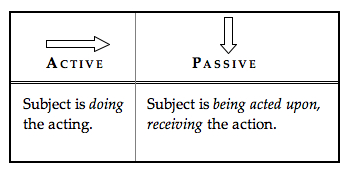What is active voice?
A sentence is in active voice when the subject of the sentence is the person/thing doing the action in the sentence. It would look something like this:
Uncle Bill is training the dog.
Subject Verb Object
When understanding active and passive voice, it's also important to understand the subject, verb, and the object of the sentence.
What is the subject? Uncle Bill is the subject position and he is doing the action. In this case, he is training the dog.
What is the verb? "Is training" is the verb in this sentence.
What is the object? The dog is the object because it is receiving the training. The verb acts upon the object.
Here is another sentence in active voice:
My dad dropped the ball.
Subject Verb Object
"My dad" is the subject and the one who dropped the ball or the "doer" of the action. The ball is what he dropped. So the ball is the object. Since my dad is the "doer" of the action and is also the subject, we know the sentence is in active voice.
So what’s passive voice?
A sentence is in passive voice when the subject isn’t actually the one doing the action. In fact, in most passive sentences, we don’t know who is doing the action.

Using the first example above, a passive sentence may look something like this:
The dog is being trained.
Subject Verb
What happened to Uncle Bill and why is the "The dog" suddenly the subject?
Passive sentences don’t usually tell us who is performing the action. Sorry Uncle Bill. Instead, the object of the active sentence, the dog, becomes the subject of the passive sentence, leaving Uncle Bill out completely.
In this passive sentence, the dog is still not doing the action even though it is the subject. That would mean he is training himself, which he isn't. Instead, we simply don’t know who is training the dog.
Here is the second active sentence changed into passive voice.
The Ball was dropped.
Subject Verb
Once again, the ball turned into the subject, but still receives the action, not does the action. We no longer know the "doer" of the action.
Here are the sentences side by side:
Uncle Bill is training the dog. The dog is being trained.
My dad dropped the ball. The Ball was dropped.
Adding a by-phrase:
You will also see sentences in passive voice that have a by-phrase added to the end to indicate the "doer" of the action.
Example:
The was dropped by my dad.
or
The dog is being trained by my uncle.
However, this is not a substitute for active voice, and a person should still correct these sentences so that they are in active voice.
So what’s the big deal?
Here’s a little scenario. Put yourself in this boy's position.
Last night, Nathan ran the 1600-meter (mile) run in track and beat the junior high school’s record by eight seconds. Nathan had worked extra hard at track practice and often ran an additional mile after running the scheduled workout with his teammates. When he finally broke the record, his coach announced it the next morning during the school announcements. However, this is what the coach said, “Students, I am happy to announce that the school’s record was broken last night at the track meet.” That was all he said. Nathan slunk slightly in his chair as he realized his coach didn’t give him any recognition for his hard work.
How could the coach have rephrased this same sentence in active voice so that the students knew Nathan broke the record?
Here is the sentence again.
"Students, I am happy to announce that the school’s record was broken last night at the track meet."
Okay, for the sake of this exercise, I am going to eliminate the very first part of the sentence and the very last part. Here is the simplified sentence:
The school’s record was broken last night.
To make this active, Nathan must be the subject of the sentence since he is the "doer" of the action. The record is what Nathan broke, so it is the object.
Nathan broke the school's record last night.
Now, here is the full sentence:
"Students, I am happy to announce that Nathan broke the school's record last night at the track meet."
Now back to the question.
Why is it so important to write in active voice?
- Active voice tells the readers who performed the action in the sentence.
- Active voice is concise and less confusing
- Active voice makes sentences more interesting because the subject "acts."
